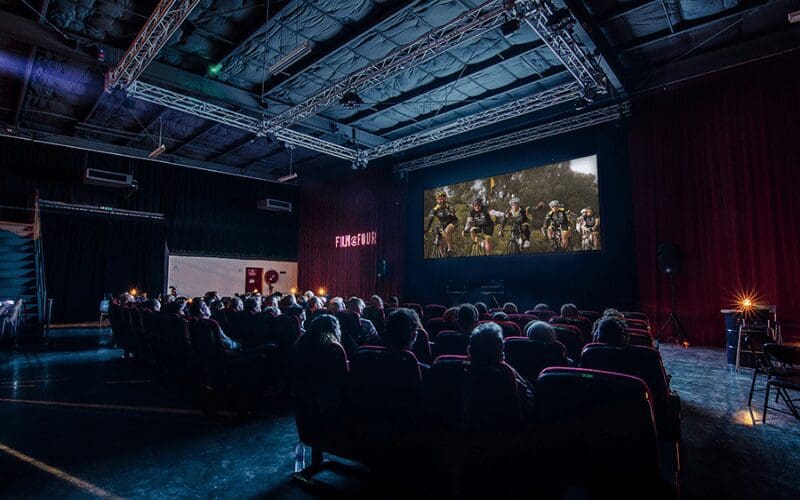In the film industry, film networking is everything. There is a direct correlation between those that use networking to their advantage and their success within the industry. A good film network will allow you to progress your career and allow you to work with some excellent industry professionals. But how do you build your film network?

In this article, we will go through why networking is important and 10 film networking tips that will help you massively within the film industry.
Be sure to stick around until the very end so you don’t miss out on any key information!
What Is Networking?

Networking is the process of getting into contact with other individuals in your chosen industry.
This usually involves attending events and making connections with others that could be useful to you in the future.
Why Is Networking Important In The Film Industry?

Building a network in the film industry will make you a valuable asset. It allows you to meet peers and people in leadership roles that can help you move forward in your film career.
Networking also expands your social network and opens up your pool of opportunities, connecting you with new people and helping you build strong relationships.
In the entertainment business, freelance work is prevalent, so making these connections is vital because it puts you in the best position to land your next job.
10 Film Networking Tips
In this section, we will go through our tips on how to network in the film industry. Let’s dive in!
Prepare Your Elevator Pitch

Before you attend your first networking event, you will need to do some preparation. Networking events are as formal as job interviews since you are showcasing your skills to someone. You do this with the hopes of making a lasting connection.
Make sure you have business cards on your person, a few icebreaker questions, and an elevator pitch for the project you’re working on. An elevator pitch is a short, persuasive speech used to gain interest in a project.
This pitch is a great way to offer a glimpse into your project without capitalizing on the conversation.
Attend Events

Film and TV networking events are the perfect places to meet other individuals in the industry. A good start for film networking is to seek out events you know writers and directors, producers, and casting directors will attend.
Good film production networking events you will want to look into are Q&As, screenings, and charity events.
Be strategic. Do your research and expand your network to include a diverse range of players in the film industry.
Successful networkers attend networking events, such as film festivals, often. Even people who have established themselves in the film industry continue to network with their peers. Always leave yourself open for new connections.
Be sure to look at entertainment sites or social media postings to see if any film-related events are happening near you. A quick Google search, such as ‘film networking London’ should suffice.
Additionally, you can sign up for advanced movie screenings. Particularly ones where the cast or crew will be in attendance to answer questions about the project.
These types of TV and film networking events attract industry hopefuls and professionals. While you’re waiting in line for the movie, why not spark a conversation with the people around you?
Also, after the screening has finished, try to hang out near the lobby or at the bar to make some new potential connections.
Make Valuable Connections

This comes back to the age-old saying – quality over quantity. Networking is about making quality connections, not collecting business cards from everyone you meet.
Organize your contacts into a tier of importance. Make sure you select a handful of the most important professional connections to place at the top. These are the people you should stay in touch with the most.
Take them out for coffee every so often. Or perhaps simply give them an occasional phone call. Social media is a great tool to keep up with what they’re doing throughout the year.
Keep the communication light and purposeful. Frequently contacting them for help can be off-putting and will make your relationship too one-sided.
Engage Online

Social media is such an effective tool for connecting with industry peers. There are a plethora of casting directors on Twitter! Follow them, engage with them and stay aware of everything that is going on around you.
There have been many actors who have begun significant career relationships, and even directly booked work, through social media!
Make sure you stay friendly and courteous, like their posts, and show an interest in their activities. Avoid bombarding or harassing a new connection for a job.
Make Friends Outside Of Work

Networking is about making connections with a range of people. Not all of you pals have to be powerful industry professionals! You can use networking to meet other aspiring actors, writers, filmmakers, and editors.
When you are networking, look out for possible connections that you share with another professional outside of entertainment. Cultivating a friendship in the networking process will almost certainly have a meaningful impact on your personal and professional growth.
Building connections outside of networking events is more authentic and organic for all parties. So start getting genuinely interested in the world around you. Start making new friends!
Add Value To Others’ Lives

In the vein of focusing out, you always want to look for ways to add value to people’s lives. Do you know of an actor who fits a role your casting director friend is looking for? Make an introduction.
Work out how you can support people in your network. You will build a reputation as a standout, reliable industry professional who gets things done.
Networking is a two-way street, and it’s important to help your connections in any way you can. Whatever you bring to the table, use it generously to let your contacts know you care about their success.
While it’s selfish to help people for the sole purpose of personal gain, offering help first makes the other party more likely to return the favor in your moment of need.
Building relationships is about give and take, and sometimes it’s important to give first.
Listen

It might be tempting to run off a list of everything you’re working on and all of your film experience at a networking event. However, it is also important to listen to what others have to say.
Active listening shows you value your new contact’s time and may reveal that you have common interests that can help further build your professional relationship with them.
Learn how to use active listening to improve your communication skills.
Follow Up

Once you meet and connect with someone, be in touch regularly. Not just when you need something. Keep up with industry publications, and know when people in your network have been promoted, have released a film, or have received any kind of award or accolade.
Reach out to congratulate people on their wins!
Schedule coffee meetings, movie screening dates, golf matches, and karaoke nights out just for the sole purpose of connecting and getting to know people. We recommend setting notifications on your calendar to remind you to reach out to certain individuals on a regular basis.
If you recently met a director or producer during a networking opportunity, follow up with them within 24 hours. Send them a courteous email, thanking them for their time.
Also, be sure to offer to help them in any way you can to solidify your connection. This will keep you on their radar.
Keep the email short and lighthearted, and avoid asking them for a favor. Your goal is to build relationships, not ask for a handout.
Consistency Is Key

Again, following up just once is not enough. It is extremely important to stay in touch with your network. At the very, very least, you should be contacting everyone in your network at least once a year.
You can set yourself reminders on your Google calendar so that you are reaching out to people on a regular basis. To reiterate, you want to add value to other people’s lives. Reach out for the sake of saying hello and checking in!
You can always have a photo or graphic attached to the footer of your email that markets any recent career wins. No need to announce them in every single networking email.
Be Patient

It can take a while to build a solid network of film professionals and peers. Stay consistent, polite, respectful, and keep yourself on people’s radar.
While some film projects are greenlit quickly, others take a long time to come to fruition. Therefore, prepare to nurture your connections for the long haul.
Those Were Our Film Networking Tips

So, there we have it! Those were our top film networking tips to help you within the film industry. We’ve gone through the importance of networking as a means of meeting other professionals who can progress your career.
Additionally, we’ve touched on everything you will need to consider to build strong relationships and add value to peoples’ lives in your short film network.
Bear in mind everything we have been through and we wish you the best of luck at your next film networking event! Remember to be the best version of yourself, be prepared, and be friendly!
Have you had any experience with networking in the film industry? We’d love to hear your experiences in the comment section below! Also, if you think your friends will find this article useful, share it on social media and tag us @musicgateway!
Are You A Filmmaker?
Need financial backing to support your project? Our film investment can back projects of all sizes from independent short films to major releases covering all corners of the globe. If that wasn’t enough, promote your work, list your upcoming films and allow fans to pre-order or buy them with your very own Showcase site. Finally, with our concierge and service and extensive music library, allow us to help you find music for your film. Check out our Music Licensing service for starters!



